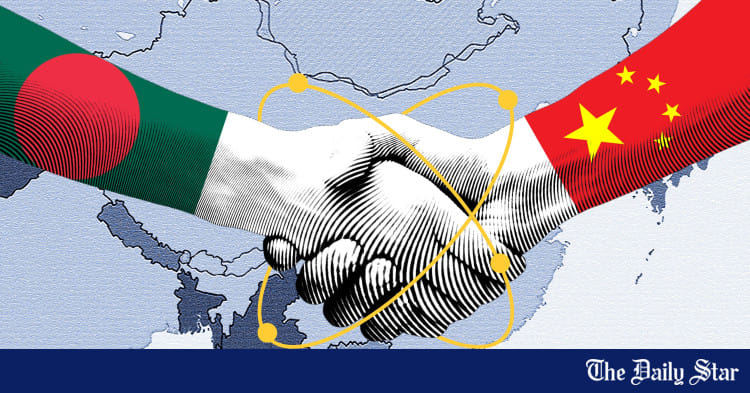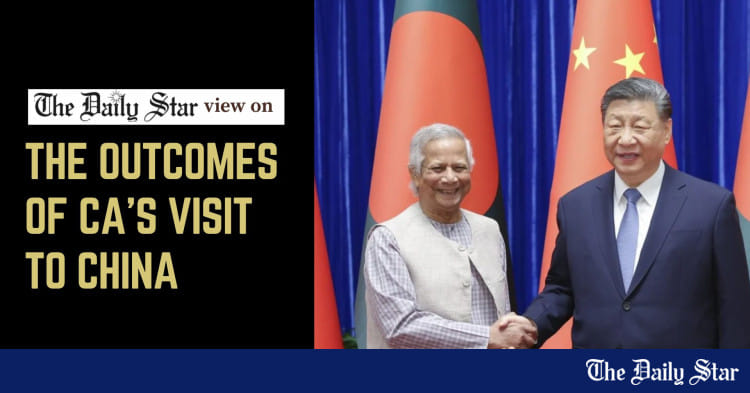Saif
Senior Member
- Joined
- Jan 24, 2024
- Messages
- 15,434
- Nation

- Axis Group


Yunus’ China trip may boost trade prospects
Chief Adviser Prof Muhammad Yunus’ visit to China laid a strong foundation to draw more investments, transfer technologies and improve cooperation, foreign policy analysts say.
Yunus’ China trip may boost trade prospects

Chief Adviser Prof Muhammad Yunus meets Chinese President Xi Jinping at the Great Hall of the People in Beijing yesterday -- the third day of his four-day visit to China. Photo: PID
Chief Adviser Prof Muhammad Yunus' visit to China laid a strong foundation to draw more investments, transfer technologies and improve cooperation, foreign policy analysts say.
During his four-day visit that ended yesterday, Prof Yunus delivered a speech at the Boao Forum for Asia Annual Conference in Hainan, met Chinese Vice-President Han Zheng, Vice-Premier Ding Xuexiang, Water Resources Minister Li Guoying and other dignitaries.
The two countries signed one agreement on economic and technical cooperation and eight MoUs. The two sides made five announcements of cooperation on investment infrastructure, and technology.
The visit dwelt on fostering commitments and exploring opportunities for trade and economic collaboration rather than immediate outcomes, foreign policy analysts observe.
Beijing expressed its willingness to start negotiations for a Free Trade Agreement and Investment Agreement with Dhaka, and promised to encourage more Chinese private investment and relocation of Chinese manufacturing plants to Bangladesh.
China promised to lend some $400 million for Mongla port modernisation, $350 million for the development of the China Industrial Economic Zone, and $150 million as technical assistance.
Besides, around 30 Chinese companies promised to invest around $1 billion in Bangladesh.
Foreign policy analysts point out that the two countries have yet to sign any agreement on Mongla port and acquisition of land for the Chinese Industrial Economic Zone remains incomplete.
"The pledges are fine, but it will take time," says Prof Sk Tawfique M Haque, director at the South Asian Institute of Policy and Governance of North South University.
The engagement with the Chinese businesses, President Xi's promise to encourage businesses to invest in Bangladesh are something that will bring Chinese investments to Bangladesh, he says.
"From that perspective, I would say there is success."
Prof Imtiaz Ahmed, executive director of the Centre for Alternatives, says the Chinese side mentioned the business climate in Bangladesh.
"I think Chinese firms will not invest here until there is a stable government led by a political party. I appreciate the engagement with the Chinese private sector though. It should continue," he says.
M Humayun Kabir, chairman of Bangladesh Enterprise Institute, says one must appreciate the fact that Beijing agreed in principle to start negotiations for a Free Trade Agreement and Investment Agreement with Dhaka.
"Once we have an agreement like that, we will see substantial Chinese investments and production units here. That will be great for our economy," he says.
In his high-level meetings, Prof Yunus sought budget support, lower interest rates on Chinese loans, and waiver of commitment fees on loans.
The Chinese side spoke positively, but there was nothing concrete, says Prof Imtiaz.
"I don't think China will lower interest rates. But it may make concessions on the repayment period," says Prof Tawfique.
Experts believe China and India can play major roles in solving the Rohingya refugee crisis in Bangladesh. China was also engaged in a tripartite arrangement, which is not functioning now because of the conflict in Myanmar.
In the joint statement, the Chinese side expressed support for Bangladesh and Myanmar in finding a mutually acceptable solution through friendly consultations.
M Humayun Kabir says Bangladesh has been working in various ways to raise funds for Rohingyas, but the Chinese statement does not put much importance on the issue.
"There was no reference to the international conference that the UN is going to organise in New York in September," he says.
China announced that it would establish a hospital in Bangladesh and four hospitals in Kunming would treat Bangladeshis. Humayun sees this as the opening of a new frontier in China-Bangladesh relations.
All the three analysts appreciate the importance that Prof Yunus laid on the river management of Bangladesh.
China has experience and technologies in dredging and cleaning the rivers. This discussion should continue, they say.
Prof Imtiaz says Bangladesh welcomed the participation of Chinese companies in the Teesta River Water Management Project, but the issue is complex.
"There are still debates among hydrologists about the project's efficiency, especially the implications of dredging on the environment. Also, there is a lack of water upstream," he says.
Prof Imtiaz says Bangladesh, India and China need cooperation when it comes to the transboundary rivers.
Humayun Kabir says Bangladesh's mention that it opposes the "Taiwan independence" may raise questions.
"We could have been more careful in phrasing," he says.
Overall, Prof Yunus' visit has a significant symbolic and political value, he adds.
The visit takes place when Bangladesh's relations with India are strained.
Asked if Prof Yunus' visit will affect Bangladesh's relations with India, Prof Imtiaz says Bangladesh's relations with the two countries are separate and should be viewed from that perspective.
"Having relations with one does not mean severing relations with the other," he adds.
Chief Adviser Prof Muhammad Yunus meets Chinese President Xi Jinping at the Great Hall of the People in Beijing yesterday -- the third day of his four-day visit to China. Photo: PID
Chief Adviser Prof Muhammad Yunus' visit to China laid a strong foundation to draw more investments, transfer technologies and improve cooperation, foreign policy analysts say.
During his four-day visit that ended yesterday, Prof Yunus delivered a speech at the Boao Forum for Asia Annual Conference in Hainan, met Chinese Vice-President Han Zheng, Vice-Premier Ding Xuexiang, Water Resources Minister Li Guoying and other dignitaries.
The two countries signed one agreement on economic and technical cooperation and eight MoUs. The two sides made five announcements of cooperation on investment infrastructure, and technology.
The visit dwelt on fostering commitments and exploring opportunities for trade and economic collaboration rather than immediate outcomes, foreign policy analysts observe.
Beijing expressed its willingness to start negotiations for a Free Trade Agreement and Investment Agreement with Dhaka, and promised to encourage more Chinese private investment and relocation of Chinese manufacturing plants to Bangladesh.
China promised to lend some $400 million for Mongla port modernisation, $350 million for the development of the China Industrial Economic Zone, and $150 million as technical assistance.
Besides, around 30 Chinese companies promised to invest around $1 billion in Bangladesh.
Foreign policy analysts point out that the two countries have yet to sign any agreement on Mongla port and acquisition of land for the Chinese Industrial Economic Zone remains incomplete.
"The pledges are fine, but it will take time," says Prof Sk Tawfique M Haque, director at the South Asian Institute of Policy and Governance of North South University.
The engagement with the Chinese businesses, President Xi's promise to encourage businesses to invest in Bangladesh are something that will bring Chinese investments to Bangladesh, he says.
"From that perspective, I would say there is success."
Prof Imtiaz Ahmed, executive director of the Centre for Alternatives, says the Chinese side mentioned the business climate in Bangladesh.
"I think Chinese firms will not invest here until there is a stable government led by a political party. I appreciate the engagement with the Chinese private sector though. It should continue," he says.
M Humayun Kabir, chairman of Bangladesh Enterprise Institute, says one must appreciate the fact that Beijing agreed in principle to start negotiations for a Free Trade Agreement and Investment Agreement with Dhaka.
"Once we have an agreement like that, we will see substantial Chinese investments and production units here. That will be great for our economy," he says.
In his high-level meetings, Prof Yunus sought budget support, lower interest rates on Chinese loans, and waiver of commitment fees on loans.
The Chinese side spoke positively, but there was nothing concrete, says Prof Imtiaz.
"I don't think China will lower interest rates. But it may make concessions on the repayment period," says Prof Tawfique.
Experts believe China and India can play major roles in solving the Rohingya refugee crisis in Bangladesh. China was also engaged in a tripartite arrangement, which is not functioning now because of the conflict in Myanmar.
In the joint statement, the Chinese side expressed support for Bangladesh and Myanmar in finding a mutually acceptable solution through friendly consultations.
M Humayun Kabir says Bangladesh has been working in various ways to raise funds for Rohingyas, but the Chinese statement does not put much importance on the issue.
"There was no reference to the international conference that the UN is going to organise in New York in September," he says.
China announced that it would establish a hospital in Bangladesh and four hospitals in Kunming would treat Bangladeshis. Humayun sees this as the opening of a new frontier in China-Bangladesh relations.
All the three analysts appreciate the importance that Prof Yunus laid on the river management of Bangladesh.
China has experience and technologies in dredging and cleaning the rivers. This discussion should continue, they say.
Prof Imtiaz says Bangladesh welcomed the participation of Chinese companies in the Teesta River Water Management Project, but the issue is complex.
"There are still debates among hydrologists about the project's efficiency, especially the implications of dredging on the environment. Also, there is a lack of water upstream," he says.
Prof Imtiaz says Bangladesh, India and China need cooperation when it comes to the transboundary rivers.
Humayun Kabir says Bangladesh's mention that it opposes the "Taiwan independence" may raise questions.
"We could have been more careful in phrasing," he says.
Overall, Prof Yunus' visit has a significant symbolic and political value, he adds.
The visit takes place when Bangladesh's relations with India are strained.
Asked if Prof Yunus' visit will affect Bangladesh's relations with India, Prof Imtiaz says Bangladesh's relations with the two countries are separate and should be viewed from that perspective.
"Having relations with one does not mean severing relations with the other," he adds.









































